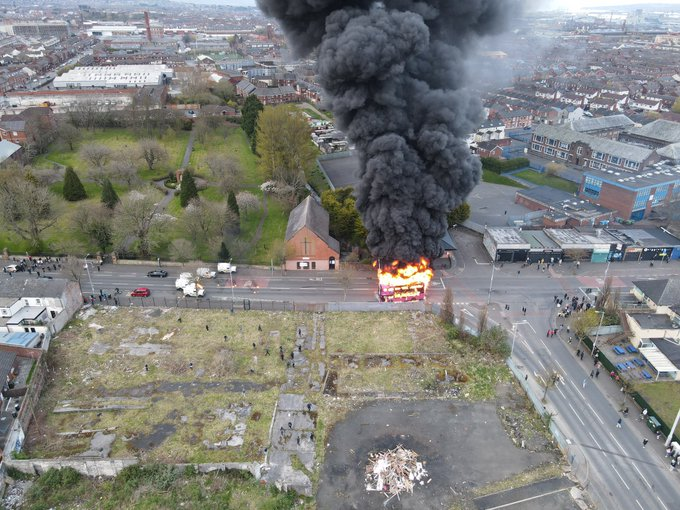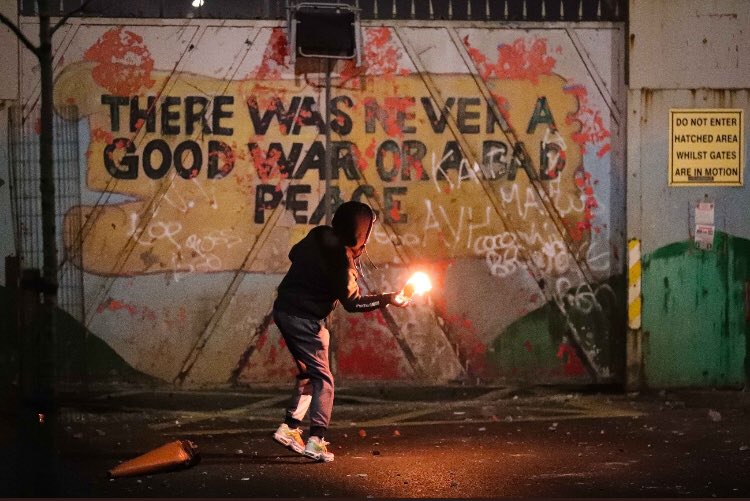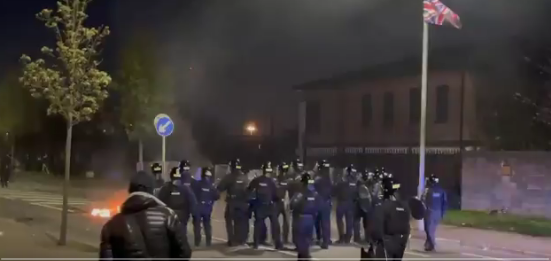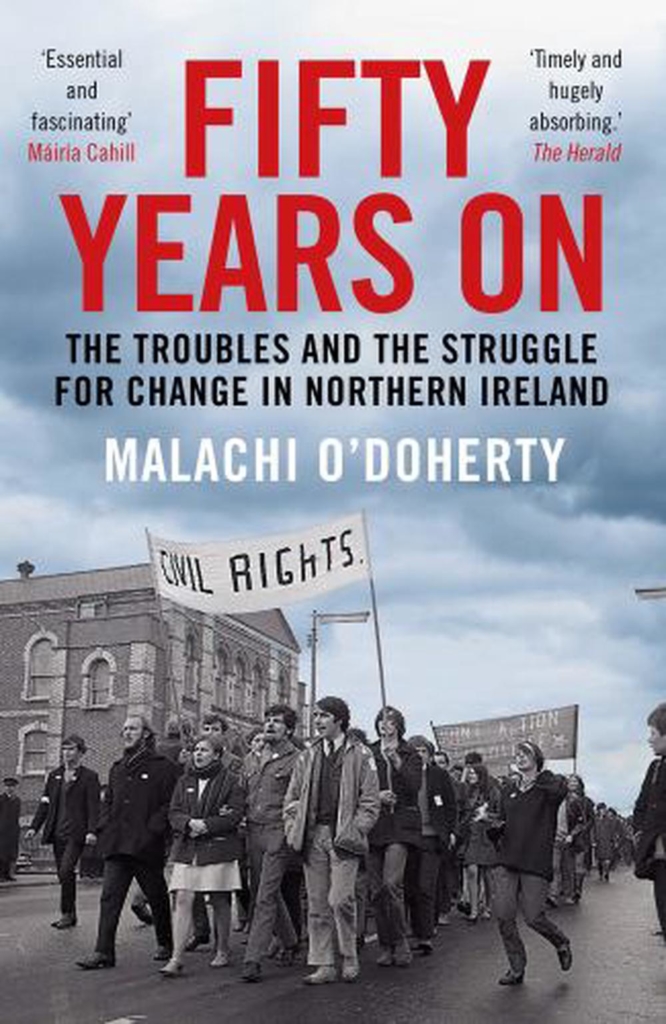Failure ‘Flegs’ and Water Cannon

Who knew that the “sunlit uplands” would smell of petrol and burnt tyres? Almost everyone.
*
The fury among Northern Irish loyalists is unimaginable but it has nowhere to go other than a regressive descent into the violence of the past. As a full week of violence stumbles onto the mainland news channels Boris’s Brexit Britain is in perilous, and much predicted decline.
*
As the Prime Minister sits in a cafe in Cornwall for a photoshoot sipping a cappuccino and looking affable police used water cannon for the first time in six years in Belfast; armoured Land Rovers and officers with helmets and shields were deployed on Thursday on the road that separates the nationalist Springfield Road from the loyalist Shankill Road.
*
Whilst the blame for the crisis lies squarely with Johnson’s brazen and cavalier attitude to Northern Ireland, it has its history not just in the Conservatives disgusting attitude to Ireland throughout the process but in the DUP’s moronic wrangling too. This is what Dark Money buys you. But if there’s dark irony in the outcome of black ops the reality too is that the violence erupts from deeper roots. Northern Ireland’s youth have little future and are “governed” (nominally) by politicians mired in opportunism and bigotry.
*
As Peter McColl has said: “The situation is on the face of it a combination of the Brexit settlement and the D.U.P. stoking tensions about policing. When combined with an underlying failure to build a future based on deeper needs than retail therapy and a huge number of disenfranchised young people, then this is a tinder box. The D.U.P. leadership is cynically exploiting this because it is the only way that can win the next elections. It’s a far away land of which the British know little. But it’s important for those who live there.”
*
The sense of despair is palpable and the current crisis has roots that are much deeper than first appear.
*
Andrew Cunning, Director of Left Side Up (“theology for the whole person”) convened a session to gather view of Belfast youth workers. Many spoke of institutional and systemic failure – of parties, churches and organisations incapable of responding and a deep failure of political leadership. Many spoke too of youth work being used as a sticking plaster and left to decay underfunded and fatally under-valued.
*
Cunning writes:
*
“The truth is that people in the margins, those who have been forgotten by their leaders, have more in common with one another than they do with their political representatives or the churches in their areas. And it is a heartbreaking thing to see marginalised young people cut off from hope, turning on one another. Churches can be beacons of hope. But they simply have to stop caring about their image, or what people might say. Throw open those doors and demonstrate the grace that holds your faith together.”
*
It may seem ironic for some that faith can be both the root problem and a solution but Ireland is nothing if not riddled with contradiction.


As Britain descends further in its terminal decline, this void of leadership – moral – political – spiritual – is critical. But if the crisis was sparked by British intransigence and delusions it also speaks to a failure of Unionism. Sarah Creighton, a lawyer, writer and political commentator from Northern Ireland has written:
The violence, even though it is on a small scale, speaks to the uneasy position of unionism and loyalism in Northern Ireland. Unionists and loyalists feel betrayed, angry and let down. Some feel unrepresented by the Democratic Unionist party (DUP) and the Ulster Unionists. There is a disconnect between members of the legislative assembly and the people on the ground. The majority do not support violence. However, the situation is delicate, and it could get worse if solutions aren’t provided.”

But if it seems that nothing ever changes that’s also not true.
*
Reviewing Malachi O’Doherty’s Fifty Years On: The Troubles and the struggle for change in Northern Ireland Richard English writes: “Brexit has of course made Northern Ireland once again famous, and it has unquestionably reinforced its divisions. Indeed, O’Doherty presents the current condition as one of enduring polarisation: “We still have a divided society that seems to want to divide wider issues between sectarian factions. So unionists now oppose abortion, same-sex marriage and support Israel while nationalists, broadly speaking, support abortion, same-sex marriage and Palestine.”

It’s dawned on unionists that they have been hoisted by their own petard! Unionists craved for brexit in the belief it cemented their position in the union and now that its come, they realise they were betrayed by the tories!
Unionist politicians had their five minutes of fame, being wooed by the tories and receiving a giant backhander for services rendered, they adored the limelight. As soon as unionists were not needed, they were dropped like a stone and the phone hasn’t rung since.
The future looks bleak for unionists, the uk government clearly wishes wash its hands of Northern Ireland. It’s difficult to justify a union, when those who unionists seek a union with, are waving two fingers at them, unionists then resort to burning down their neighbourhood in frustration.
It’s going to be a long hot summer in Northern Ireland, this is all down to Johnson’s brexit betrayal, Johnson’s ambivalence towards Northern Ireland, unionists’ support of brexit and a belief that violence will bring about what you want. Problem is, unionists don’t know what they want other than to turn back the clock!
As for a solution, there isn’t one whilst the Johnson government and the current crop of unionist politicians are in position!
Poor Boris getting all the blame again . He is the front man , remember .
Others have their hands up his arse working him ! But the result is still the same – incompetence , confusion and now conflict !
Around the time a second Brexit referendum looked a distinct possibility the gov.uk site rejected my petition ‘Revoke article 50 and give the English an independence referendum’ on the grounds it was a “joke”. When I was discussing it on MSN one of the complaints was “what about all the people in Scotland and Ireland who want to remain part of the UK?”. I was saying they should all be given the opportunity to relocate to England (similar to the offer later given to those in Hong Kong). I added that if they decided to take up the offer en masse it would serve the English right.
Truth is though, there’s a much greater probability Westminster will attempt to dump them on us.
Could it be that this will be our last chance to fly away from the cuckoo’s nest? Westminster would love to be shot of Ireland. Suppose they committed to giving up any claim to Ireland, funded large scale house building in Scotland and offered loyalists generous packages to relocate to there. The loyalist lot is pretty miserable where they currently are and this would bring them closer to their beloved football club and their many friends here. It would probably also mean a unionist majority in Scotland until the twelfth of never. Is this any more far fetched than the lunacy of Brexit?
And you’re right: such a homecoming would contribute an interesting dynamic to the ongoing polarisation of Scottish society into unionist and nationalist communities.
Unless of course the Unionists coming back from N.Ireland swopped places with the Irish/Catholics of Glasgow who could then return to their ‘ancestral lands’
That way Glasgow Celtic could then become Belfast/Derry Celtic , no more Old firm derbies and I could safely take the grandkids into Glasgow on a saturday afternoon.
Sorted!
Always assuming they’re white, anglo-saxon, protestant, heterosexuals John.
Disgustingly racist, Enoch Powell-esque suggestions there from John Learmonth (Tom Ultuous not far behind).
Would this site allow the same kind of ‘joke’ about Scotland’s black/Jewish/muslim/traveller/English-born people to pass without comment?
This a kind of invidious, elitist, othering hate speech that’s tolerated as virtue/status signaling among our bourgeoisie. Yes, John, we get it: you don’t like the working classes or their volubility; you’re just a kindly old law abiding grandfather; anybody who doesn’t completely accord with lowland presbyterianism in attitudes and ancestry is at best a second class Scot, etc, etc.
If you don’t like Glasgow, away and clutch your fascist pearls somewhere else of a Saturday.
” I could safely take the grandkids into Glasgow on a saturday afternoon.”
Hope you had a good, safe day with them on Saturday John.
Not a mention of the riots on national TV. Johnson’s “British Super League” myth abides.
If Scotland votes NO and Ireland votes YES disgruntled loyalists will be offered generous packages to relocate to the British colony of Scotland thus ensuring a unionist majority there until 1691. Scotland – a green beacon of renewable energy OR a ghettoised dumping ground for Eton toff problems of their own making. It’s your choice.
A case of the Scots coming home, Tom.
Of course, Northern Ireland being part of the UK, there’s nothing to stop the descendants of the Ulster Planters from simply flitting back to Scotland under their own steam, which they might well do should they feel sufficiently threatened as an identity.
Partly my point PB. If we sign ourselves out of the asylum before it all happens there will be only one place they’ll be able to go if they want to stay in Britain. Of course if we escape there’s no way Westminster would then be flirting with any solution that would bring about such a migration.
Are you arguing that if Scotland becomes independant it would be free to turn its back on ‘fellow Scots’.
The lunacy of ‘identity politics’.
Incidentally i suspect the overwhelming majority of both nationlist and unionist ‘communties’ are white and heterosexual.
Whether their catholic or protestant is entirely their choice and the term ‘anglo-saxon’ as opposed to what? Gaelic. Genetically no difference whatsover as indeed between all so called ‘human races’
Reminds me of the old anecdote…..Taxi driver
gets stopped in Belfast in the height of the troubles, are you a catholic or protestant?
Taxi driver replies, I’m a buddhist.
Well reply the terrorists are you a catholic or a protestant buddhist?
If everybody in N.Irleand (or anywhere else for that matter) had decent well paid, secure jobs nobody would give a fig about their ‘identity’ as they’d be too busy working.
Conflicts arise when people have nothing to do……..
“Are you arguing that if Scotland becomes independant it would be free to turn its back on ‘fellow Scots’.”
Where did I say that? I did say “there will be only one place they’ll be able to go if they want to stay in Britain” which is a totally different thing. Given that clinging to their oppressors often appears to be their sole reason for existence it seems a fair point to me. I agree with the rest of your post but they’re unlikely to end up in “decent well paid, secure jobs” until they stop clinging and turn on their real enemy. That applies to much of working class England as well.
Tom,
I’m glad you agree with me that class is the main determinant of a persons life chances, but why do you highlight the ‘English’ working class as opposed to the ‘Scottish’ working class and their ‘common enemy’.
Is it by any chance that if both ‘groups’ realised their commanality of interest Scottish independence would be dead in the water as historically ‘nationalist’ parties have overwhelming been made up of the middle classes?
Working class people, however defined, are far more concerned about decent jobs/wages etc, what ‘country’ they live in is of secondary importance.
“Is it by any chance that if both ‘groups’ realised their commanality of interest Scottish independence would be dead in the water”
It probably would as we’d still be in the EU and wouldn’t have a division of Eton toffs forced on us on a near permanent basis. There are too many working class ‘groups’ who are over fond of having a bit of public schoolboy cock stuffed right up them and no matter how far up it’s stuffed they always seem to have room for more. The flag wavers are the worst culprits. To quote the German philosopher Arthur Schopenhauer “Every miserable fool who has nothing at all of which he can be proud, adopts as a last resource pride in the nation to which he belongs; he is ready and happy to defend all its faults and follies tooth and nail, thus reimbursing himself for his own inferiority.”
Full quote
The cheapest sort of pride is national pride; for if a man is proud of his own nation, it argues that he has no qualities of his own of which he can be proud; otherwise he would not have recourse to those which he shares with so many millions of his fellowmen. The man who is endowed with important personal qualities will be only too ready to see clearly in what respects his own nation falls short, since their failings will be constantly before his eyes. But every miserable fool who has nothing at all of which he can be proud adopts, as a last resource, pride in the nation to which he belongs; he is ready and glad to defend all its faults and follies tooth and nail, thus reimbursing himself for his own inferiority.
I completely agree about the failures of Brexit Little Britain unionism. But I think this also needs to be a cautionary tale for Scottish independence. Decision making based on a 50% +1 majority was inherently flawed as it failed to take into account the concerns of particular individuals and communities who would be unusually affected by Brexit. People were invited to vote for an abstract concept of ‘taking back control’ with no guarantees as to what that would look like in practice. And the Brexiteers denied the inevitability of a hard border (either in the Irish Sea or on the island of Ireland) right up to the moment it came into existence (and sometimes even afterwards).
In my opinion we need to build broad consensus for independence (perhaps through citizens assemblies in addition to referendums). We need mechanisms to go beyond ‘Yes’ and ‘No’ to establish what an independent Scotland will look like. And politicians need to treat the public like grown ups, spelling out the pros and cons of each position. I know this is a lot to ask, but the whole point is that we believe we can avoid the failings of the nation state we’re leaving behind.
Issues like a hard border between Scotland and England perchance? I have heard people say there won’t be one (without any explanation of how if EU membership is so important) or more worryingly, there will be, and good, keep the bastards out at last.
I hate to say it but the closer independence gets the more the hatred rises both of those south of the border, and worst of all, internally; the clan infighting has kicked into a whole new gear worst kind of bigotry. In my darkest moments I vision the first years of independence being dominated by the most awful internecine strife.
Were we to re-join the EU the border would be less of a problem than THEY like to make out. So far, imports from the EU haven’t been affected to the same degree as exports. If that continued the “we export more to England than we do to the EU” argument isn’t as important as THEY would like to make out. Travel between the countries would continue much as before in the same way “UK” – Ireland travel does. Of course Westminster (brokers of Faroe Islands / Palestinian Authority mega trade deals) will tell us there will be no trade deal with the “UK”. Strange, isn’t it? A country desperate for trade deals doesn’t want to trade with its next door neighbour who they’ll be reliant on for water / energy in ~25 years.
The EU is the solution to all our problems……
Repent oh you sinners and bow down to omnipotent Brussels.
The UK electorate wasn’t invited to vote on the abstract concept of ‘taking back control’; it was invited to vote on the question of whether the UK should remain a member of the EU or leave the EU. Taking back control of our own decision-making was cited as a reason to vote to leave.
But I agree that majoritarianism is a sh*t form of democracy because it disregards or ‘cancels’ minorities in the determination of the general will of society.
I also note the polarisation of the general will in Scotland into the two hostile and irreconcilable ‘camps’ of nationalism and unionism. I don’t see how that dichotomy, if it remains undeconstructed, can issue in anything other than an ever-deepening entrenchment of the conflict between its rival communities.
Unionism is nationalism!
In the sense that Unionism defends and supports the existence of the British nation state, arguably, yes. But then any person who supports the nation they live in can be called a nationalist making the word meaningless. People understand the difference between nationalism proper and simply wanting the country one lives in (in this case the union of several countries, i.e the UK) to continue to exist and to argue against those who want it no longer to i.e. the actual nationalists who want one of those countries that make up the union to be an independent nations state once more. To deny that difference is meaningless and is playing with words in the same I way I could argue the British state is a union not a nation so supporting its existence could never be nationalism. It also tars anyone who does not want Scottish independence a unionist by default, and therefore a ‘BritNat’, yet the whole ‘BritNat’ thing is actually an attempt to deflect criticisms of nationalism as an ideology. It is, however, empty rhetoric and actually highlights one of those criticisms that nationalism can be actively divisive.
I agree. And that observation leads us neatly into the question of what makes a nation a ‘nation’. I work on the assumption that a nation is a body of people who share an identity.
This identity used to be (and still is, anachronistically, in some quarters) ethnically based; that is, on a shared racial and/or cultural heritage, as defined in contrast to that of ‘others’. However, these identities have largely dissolved in the fluid cosmopolitanism of postmodern global society; though we are still ‘haunted’ by them in our nostalgia for lost futures.
(Something similar has happened in relation to our traditional class and class-based political identities, by which we a similarly haunted. But that’s another story.)
The old exclusive ethnically-based nationalism that continues to haunt us are nevertheless dissolving into a more inclusive civic nationalism, within which national identity is defined in terms of our political citizenship (and, in the case of unionism, in terms of our overlapping citizenships) rather than blood and birthright.
(This post should be read to the strains of L’Internationale: https://youtu.be/IcS_sjbJNDI
Yes I largely agree though nationalism still seems like an actual ideology to me rather than just accepting that what defines a nation in terms of its people has evolved. Nationalism is not passive, it is active, deeply felt, does not dissipate except over centuries (and even then), and whatever its terms of reference, it seeks to harden up the concept of a nation and its difference and distinctiveness to other nations (especially neighbouring ones). It is exclusive and separative at heart rather than inclusive and uniting. It is the total opposite of ‘imagine there’s no countries’.
Whether that is a good or bad thing depends very much on the situation and I am always torn on this – I support autonomy for Scotland wholeheartedly but dislike all the divisiveness and negativity (something that these pages are so full of it I wonder sometimes how people don’t tire of it, see through it). Scottish nationalism seems mostly built on negativity and hatred (quite literally at times) of Britain (and hovering, unspoken in the background, the English) and what is happening now is that that hatred has turned inwards as bile tends to in the end. Maybe it was ever thus though – a nation trying to regain its autonomy must first and foremost emphasise the supposed iniquity of the country it wants autonomy from?
I find it useful to think of nationalism as being essentially the notion that the state (an organised political community under one government) should coincide with the nation. Different forms of nationalism can then be distinguished on the basis of what each conceives a ‘nation’ as consisting in.
For example, is ‘Scotland’ a geographical expression, which designates the northern half of the North Atlantic archipelago that lies off the north-western coast of continental Europe and is commonly known as the British Isles? If so, then nationality will consist in simply living within that geographical region.
Or is it a ‘heimat’ expression, designating the homeland of a distinct ethnicity, as defined by race and/or culture? In which case, nationality will consists in belonging to that (perceived) bloodline and/or cultural tradition.
Or is it a political expression, designating nothing more than the formal extent of a practical authority’s jurisdiction in public decision-making and the administration of justice? In which case nationality will consist in nothing more than being subject to the jurisdiction of that authority; that is, in being a citizen.
None of these alternatives is ‘true’ in the sense of being objectively given. We have a choice as to how we constitute ourselves as a nation. I think the latter – civic nationalism – is ‘true’ in the sense of being the most pragmatically useful postulate one can put towards realising the goal of making our increasingly plural and cosmopolitan (‘global’) society more just and democratic, for reasons to which I’ve alluded ad nauseum on this site.
June 2018, and our Foreign Secretary, Boris Johnstone speaks at what he thought was a private function, organised by the Thatcherite think-tank, Conservative Way Forward:
“It’s so small [N.I.] and there are so few firms that actually use that border regularly, it’s just beyond belief that we’re allowing the tail to wag the dog in this way.
“We’re allowing the whole of our agenda to be dictated by this folly.”